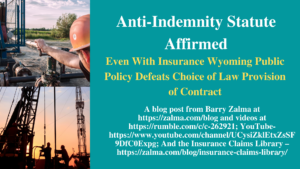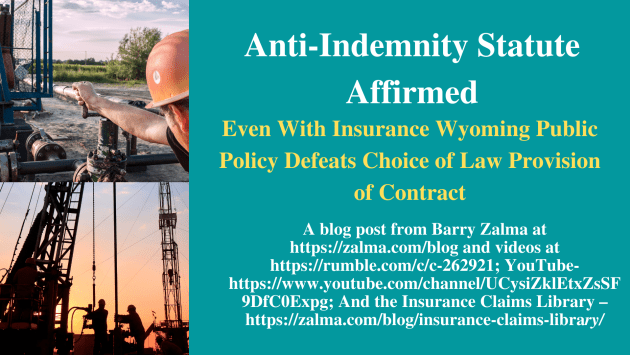Anti-Indemnity Statute Affirmed


Texas and Wyoming are leading oil-producing states. Like other leading energy states, they both regulate the use of indemnity agreements in their oilfields with Anti-Indemnity Acts. Wyoming, concerned that indemnification disincentivizes safety, forbids oilfield indemnity agreements. Texas, concerned that large oil companies will use their leverage to demand indemnity from independent operators, also disfavors the agreements. But it does not ban them entirely. To address the bargaining-power problem, it allows indemnification in limited situations including when the indemnity is mutual and backed by insurance. In Cannon Oil and Gas Well Services, Incorporated v. KLX Energy Services, L.L.C., No. 21-20115, United States Court of Appeals, Fifth Circuit (December 10, 2021) the Fifth Circuit was asked to enforce indemnity agreement in contract.
Wyoming & Texas Have Different Laws Concerning Oilfield Indemnity Laws
A contract for the leasing and servicing of drilling equipment includes a mutual indemnity agreement that complies with Texas law but would be unenforceable under Wyoming’s blanket ban. Although the agreement states that Texas law will govern, most of the work performed under the contract occurred in Wyoming with none in Texas. And indemnity is being sought for a Wyoming lawsuit filed by a Wyoming resident injured in a Wyoming oilfield operated by a Wyoming business.
FACTS
Cannon Oil and Gas Well Services is an oil-and-gas exploration company based in Wyoming. When Cannon needed to lease drilling equipment, it contracted with Texas-based KLX Energy Services.
The parties memorialized their deal in a “Master Equipment Rental Agreement,” which governs “all Equipment rented . . . as well as any services provided by [KLX to Cannon].” The document includes a choice-of-law clause providing that Texas law governs the agreement. It also contains an indemnity provision under which Cannon and KLX must “protect, defend, [and] indemnify” each other against losses involving injuries sustained by the other’s employees, regardless of who is at fault.
Unlike the Master Agreement, the Work Order’s indemnity provision does not include a separate clause limiting the parties’ indemnity obligation “to the maximum extent permitted by applicable law.”
Initial discussions about the agreement occurred entirely in Wyoming, where KLX maintains a significant presence. Cannon later executed the documents in Wyoming; KLX did so in West Virginia. An employee from KLX’s Wyoming office was performing a pressure test on KLX equipment at a Cannon oil well in Southern Wyoming. The employee was injured. He then sued Cannon in state court in his home state of Wyoming.
ISSUE: Which State’s Statute Applies
If the Master Agreement’s indemnity provision is valid, KLX is ultimately on the hook for injuries suffered by its employee even if Cannon was at fault. Cannon sued seeking declaratory judgment to enforce KLX’s indemnity obligation for the Wyoming lawsuit.
After the parties filed dueling summary judgment motions, the district court ruled in KLX’s favor. Because Wyoming bans oilfield indemnity, the indemnity provision in the Master Agreement was unenforceable. Cannon thus would have to defend itself in Wyoming state court.
ANALYSIS
The Fifth Circuit, reading the Master Agreement recognized that even under applicable Texas law, indemnity provisions will not always be enforced.
The question becomes whether the parties’ choice of Texas law is enforceable for this Wyoming-centered indemnity dispute.
Enforcing what the parties bargained for promotes efficiency and certainty. But when it comes to enforcing a contractual choice-of-law provision, freedom-of-contract values collide with a state’s interest in regulating conduct within its borders. State laws regulating contracts would lose much of their bite if parties could oust them by agreeing to apply laws from a favored jurisdiction. If regulation is desirable, then choice of law creates a race to the bottom by eroding efforts to eliminate social harms.
Texas’s choice-of-law rules, which we apply as a federal court sitting in diversity harmonize this tension. The conflict-of-laws principle of limited party autonomy. Under it, although Texas courts permit choice-of-law agreements and the default position is that they are enforceable, it is not uncommon for a party to overcome them.
Texas courts look to section 187(2)(b) of the Restatement (Second) of Conflict of Laws to determine whether to enforce a contractual choice of law. DeSantis, 793 S.W.2d at 677-78. Under that section, three things must be true for Wyoming law to override the parties’ choice of Texas law.
Wyoming must have a more significant relationship with the parties and transaction than Texas does under section 188 of the Restatement.
Wyoming must have a “materially greater interest” than Texas in applying its law to this set of facts.
Applying Texas law must be contrary to a fundamental policy of Wyoming. Central to these inquiries is each state’s interest in the particular substantive issue to be resolved-here, indemnity.
To overcome the parties’ choice of Texas law, Wyoming must have a “more significant relationship” to Cannon and KLX’s indemnity agreement. Put differently, would Wyoming law apply had the parties not chosen Texas?
The place of performance favors Wyoming. The Supreme Court of Texas has not decided whether the relevant place of performance in indemnity cases is where the drilling or the suing takes place. The distinction does not matter here as Wyoming is the site of both the drilling and the suing. The contacts thus overwhelmingly favor Wyoming. Four favor Wyoming with one being neutral. None favor Texas.
Parties generally expect that the law of the place of negotiation, contracting, and performance-none of which were Texas here-will govern. Even if the protection of justified expectations favors applying Texas law, those expectations can be overcome if they are substantially outweighed by the interests of the state with the invalidating rule.
The extent of the interest of a state in having its rule applied should be determined in the light of the purpose sought to be achieved by the rule and by the relation of the transaction and the parties to that state. Wyoming’s concern that indemnity undermines safety has great force in a dispute seeking indemnification for an injury to one of its residents in one of its oilfields. In the absence of a choice-of-law clause, Wyoming law would apply to this indemnity demand for a Wyoming lawsuit brought by a Wyoming resident performing work in the state for a Wyoming company.
To overcome the parties’ contrary choice of Texas law, KLX must next show that Wyoming’s interest in this indemnity matter is “materially greater” than Texas’s. It easily is. Wyoming bans oilfield indemnity provisions so that oil and gas companies “internalize the costs of their own operations” and become “more mindful of employee safety.” Lexington Ins. Co. v. Precision Drilling Co., 830 F.3d 1219, 1220 (10th Cir. 2016). This policy stems from Wyoming’s deep experience with the “hazardous undertaking” of drilling and mining.
Wyoming’s interest in promoting worker safety in its oilfields is at its zenith on these facts. The underlying state court proceeding-in which a Wyoming resident was injured in Wyoming by the alleged negligence of a Wyoming oil company-implicates Wyoming’s policy with precision. Enforcing the indemnity provision would discourage what Wyoming hopes to encourage-Cannon’s taking steps to avoid injuries in its oilfield operations.
Wyoming’s ban on oilfield indemnification is codified and voids any such agreement as being against public policy. Because Wyoming has taken the unusual step of stating the policy explicitly in a statute, and will refuse to enforce an agreement contrary to the policy even when other states connected to the agreement would enforce it, the anti-indemnity policy is a fundamental one.
The Fifth Circuit concluded, therefore, that Wyoming law applies. Its Oilfield Anti-Indemnity Act does not allow Cannon’s claim for indemnification.
Texas allows indemnity agreements if there is insurance available. Wyoming does not. Texas thinks its people would be protected by insurance. Wyoming stated a public policy in a statute and does not think the availability of insurance will protect its oil field workers. Since one was injured the public policy of Wyoming was applied and the attempt to choose Texas law failed.
© 2021 – Barry Zalma
Barry Zalma, Esq., CFE, now limits his practice to service as an insurance consultant specializing in insurance coverage, insurance claims handling, insurance bad faith and insurance fraud almost equally for insurers and policyholders.
He also serves as an arbitrator or media
tor for insurance related disputes. He practiced law in California for more than 44 years as an insurance coverage and claims handling lawyer and more than 54 years in the insurance business.
Subscribe to Excellence in Claims Handling at https://barryzalma.substack.com/welcome.
He is available at http://www.zalma.com and zalma@zalma.com. Mr. Zalma is the first recipient of the first annual Claims Magazine/ACE Legend Award. Over the last 53 years Barry Zalma has dedicated his life to insurance, insurance claims and the need to defeat insurance fraud. He has created the following library of books and other materials to make it possible for insurers and their claims staff to become insurance claims professionals.
Go to training available at https://claimschool.com; articles at https://zalma.substack.com, the podcast Zalma On Insurance at https://anchor.fm/barry-zalma; Follow Mr. Zalma on Twitter at https://twitter.com/bzalma; Go to Barry Zalma videos at https://www.rumble.com/zalma ; Go to Barry Zalma on YouTube- https://www.youtube.com/channel/UCysiZklEtxZsSF9DfC0Expg; Go to the Insurance Claims Library – https://zalma.com/blog/insurance-claims-library/ The last two issues of ZIFL are available at https://zalma.com/zalmas-insurance-fraud-letter-2/ podcast now available at https://podcasts.apple.com/us/podcast/zalma-on-insurance/id1509583809?uo=4
Like this:
Loading…
Related



